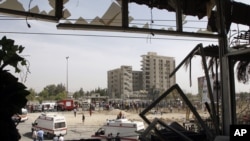Syrian authorities say a double suicide bombing in Damascus has killed at least 55 people and wounded another 370, making it the country's deadliest attack since an opposition uprising began 14 months ago.
The twin blasts, not more than a minute apart, rocked the Syrian capital during morning rush hour, crushing and burning dozens of vehicles and sending plumes of black smoke into the air. The blasts took place on a highway flanked by two government security compounds.
Syrian state television reported that two car-bombers detonated their vehicles in the early morning rush hour in the Qazaz region of Damascus. The report said that 1,000 kilograms of explosives were used, blasting large craters into the highway.
There was no immediate claim of responsibility for the attack.
The Syrian government blamed the bombings on terrorists whom it says are behind the revolt against President Bashar al-Assad. The main exiled Syrian National Council, however, accused the government of orchestrating the attack to try to smear the opposition movement and scare away a U.N. observer mission.
General Fayez Amro, who recently defected to the opposition Free Syrian Army, told al Arabiya TV that the explosives used in the blasts were available only to foreign intelligence services and were not available inside Syria.
Through the day, workers picked through the rubble of mangled cars and wreckage burned beyond recognition, as rescue vehicles flooded the scene.
A young girl in a nearby neighborhood sobbed, asking what people had done to deserve such an attack. Another man said he had moved his children away from the windows after the first blast, before being hit by debris from the second. Shards of glass and concrete littered nearby streets as walls of buildings were torn open.
A crowd of pro-government supporters chanted slogans in favor of the Syrian president, as they accompanied the head of the United Nations observer team, Norwegian General Robert Mood, to the scene of the blasts.
Mood, whose convoy was targeted by a roadside bomb blast Wednesday, told reporters that the bombings were a disaster for all of Syria, no matter who was responsible.
"My very clear message to anyone that is engaging in this kind of violence is that it is not going to solve any problems," said Mood. "So, we need everyone inside Syria [and] everyone outside Syria to understand that this is going to only create more suffering for the Syrian people."
Hilal Khashan, who teaches political science at the American University of Beirut, said that "no matter who may have been behind the blasts," they have delivered a serious blow to a cease-fire brokered last month by international envoy Kofi Annan that has been violently deteriorating by the day.
The twin blasts, not more than a minute apart, rocked the Syrian capital during morning rush hour, crushing and burning dozens of vehicles and sending plumes of black smoke into the air. The blasts took place on a highway flanked by two government security compounds.
Syrian state television reported that two car-bombers detonated their vehicles in the early morning rush hour in the Qazaz region of Damascus. The report said that 1,000 kilograms of explosives were used, blasting large craters into the highway.
There was no immediate claim of responsibility for the attack.
The Syrian government blamed the bombings on terrorists whom it says are behind the revolt against President Bashar al-Assad. The main exiled Syrian National Council, however, accused the government of orchestrating the attack to try to smear the opposition movement and scare away a U.N. observer mission.
General Fayez Amro, who recently defected to the opposition Free Syrian Army, told al Arabiya TV that the explosives used in the blasts were available only to foreign intelligence services and were not available inside Syria.
Through the day, workers picked through the rubble of mangled cars and wreckage burned beyond recognition, as rescue vehicles flooded the scene.
A young girl in a nearby neighborhood sobbed, asking what people had done to deserve such an attack. Another man said he had moved his children away from the windows after the first blast, before being hit by debris from the second. Shards of glass and concrete littered nearby streets as walls of buildings were torn open.
A crowd of pro-government supporters chanted slogans in favor of the Syrian president, as they accompanied the head of the United Nations observer team, Norwegian General Robert Mood, to the scene of the blasts.
Mood, whose convoy was targeted by a roadside bomb blast Wednesday, told reporters that the bombings were a disaster for all of Syria, no matter who was responsible.
"My very clear message to anyone that is engaging in this kind of violence is that it is not going to solve any problems," said Mood. "So, we need everyone inside Syria [and] everyone outside Syria to understand that this is going to only create more suffering for the Syrian people."
Hilal Khashan, who teaches political science at the American University of Beirut, said that "no matter who may have been behind the blasts," they have delivered a serious blow to a cease-fire brokered last month by international envoy Kofi Annan that has been violently deteriorating by the day.
|
Join the conversation on our social journalism site - Middle East Voices. Follow our Middle East reports on Twitter and discuss them on our Facebook page. |





